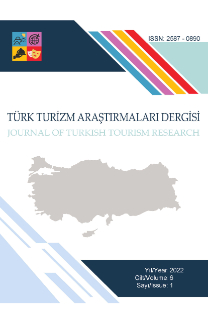Kendimizi Pazarlayabiliyor muyuz? Yüksek Öğretimde Küreselleşme ve Öğrenci Hareketliliği: Turizm ve Otel İşletmeciliği Okullarının Karşılaştırması ile İlgili Bir Örnek Çalışma
Son araştırmalara göre dünya çapında yoğun bir öğrenci hareketliliği gözlemlenmektedir. Bu da eğitim kurumlarının gerekli bilgileri elektronik ortamda sağlamalarını kaçınılmaz kılmaktadır. Bu araştırma turizm ve otel işletmeciliği okullarını resmi web sayfalarında ki bilgilerini kullanarak yapıları, ders programları ve staj programları açısından değerlendirmeyi ve karşılaştırmayı amaçlamaktadır. Sonuçlar, bütün dünyadan, karşılaştırılan okullar arasında benzerlikler kadar farklılıklar da olduğunu göstermektedir. Bu araştırmanın bulgularının konuyla doğrudan ya da dolaylı olarak alakası olan öğrenciler, eğitimciler, sektör çalışanları ve karar vericiler de dahil olmak üzere, eğitim sisteminin tüm paydaşlarına faydalı olması ümit edilmektedir.
Are We Marketing ourselves: Higher Education Globalization and Student Mobility a Case Study of Comparison of Tourism and Hotel Management Schools
Recent researches from international statistics show there is a big flow of student mobility all over the world, which makes it inevitable to provide necessary information on educational institutions. This study examines and compares tourism/hotel management programs in different levels including nature of programs, their curriculum and industrial training components by analysing the information given on the official web pages of the schools. Results show there are similarities as much as differences all around the world within the frame of the institutions compared. It is hoped that the findings could help the stakeholders of the education systems, students, educators, professionals, decision maker and more.
___
- Airey, D. (2015). 40 Years of Tourism Studies–A Remarkable Story. Tourism Recreation Research , 40(1):6-15.
- Annandale, W. (2013). http://www.guardian.co.uk/higher-educationnetwork/blog/2013/feb/04/higher-education-marketing-predications-2013
- Buhalis, D. and Law, R. (2008). Progress in Information Technology and Tourism Management: 20 Years On and 10 Years After the Internet—The State of Etourism Research. Tourism Management, 29(4): 609-623.
- Daniel, A. D., Costa, R. A., Pita, M. and Costa, C. (2017). Tourism Education: What About Entrepreneurial Skills? Journal of Hospitality and Tourism Management, 30: 65-72.
- Fidgeon, P. R. (2010). Tourism Education and Curriculum Design: A Time for Consolidation and Review? Tourism Management, 31(6): 699-723.
- Jafari, J. (1990). Research and Scholarship: The Basis of Tourism Education. Journal of Tourism Studies, 1: 33-41.
- Jafari, J. (1997). Tourismification of The Profession. Chameleon Job Names Across the Industry. In: WTO, Human Capital in The Tourism Industry of The 21st Century. Madrid: WTO, 202-214.
- Jenkins, C. L. (1997). Tourism Education Systems, Institutions and Curricula: Standardisations and Certification. in WTO (Ed.) Human Capital in The Tourism Industry of The 21st Century. WTO: Madrid, 215-221.
- High Level Group on Tourism and Employment, (1998). European Tourism and New Partnerships or Jobs. Conclusions and Recommendation of the High Level Group On Tourism and Employment. Bruxelles: EU-Commission.
- http://Www.Uis.Unesco.Org/Education/Pages/International-Student-Flow-Viz.Aspx
- http://monitor.icef.com/2014/02/summing-up-international-studentmobility
- http://www.oecd.org/education/skills-beyond-school/AHELOFSReportVolume1. pdf, p. 26
- http://www.oecd.org/innovation/policyplatform/48137663.pdf
- ILO (2001). Human Resources Development, Employment and Globalization in the Hotel, Catering, and Tourism Sector. Geneve: ILO.
- Johanson, M., Ghiselli, R., Shea, L. J. and Roberts, C. (2011). Changing Competencies of Hospitality Leaders: A 25-Year Review. Journal of Hospitality & Tourism Education, 23(3): 43-47.
- Kozinets, R, V. (March 2010). Netnography: The Marketer’s Secret Weapon How Social Media Understanding Drives Innovation. http://info.netbase.com/rs/netbase/images/Netnography_WP.pdf
- Leslie, D. (1993). Higher Education for Hospitality and Tourism: A European Dimension. International Journal for Hospitality Management 12(1), 101-107.
- OECD, Education at a Glance 2013: OECD Indicators, Indicator C4 www.oecd.org/edu/eag.htm
- Majó, F. J. (ed.) (2004) Grado de Turismo. Available from: http://www.aneca.es/modal_eval/docs/libroblanco_jun05_turismo.pdf.(Accessed 30 May 2006)
- Malan, G. G., Cobanoglu, C. and Waldo, R. D. (2015). The Use of Personality Styles in Designing Curriculum in Hospitality Schools. Journal of Human Resources in Hospitality & Tourism, 14(1): 90-105.
- Sheldon, P. J., Fesenmaier, D. R. and Tribe, J. (2011). The Tourism Education Futures Initiative (TEFI): Activating Change in Tourism Education. Journal of Teaching in Travel & Tourism, 11(1): 2-23.
- Tribe, J. (2005). Overview of Research. In: D. Airey and J. Tribe (Eds.), An International Handbook of Tourism Education, 25-43. UK: Elsevier.
- Wallis, C. and Steptoe, S. (2006, December 10). How to Bring Our Schools Out of The 20th Century? Time. Retrieved April 3, 2007, From The Future Of Tourism Education Summit 2007 Web site: http://www.tourism.wuwien.ac.at/Summit/Material/How_to_bring_our_schools_out_of_the_20th_ Century.pdf
- Wang, J., Huyton, J., Gao, X. and Ayres, H. (2010). Evaluating Undergraduate Courses in Tourism Management: A Comparison Between Australia and China. Journal of Hospitality, Leisure, Sports and Tourism Education (Pre-2012), 9(2): 46.
- Volgger, M. and Pechlaner, H. (2015). Interdisciplinarity, Transdisciplinarity and Postdisciplinarity in Tourism and Hospitality Education. The Routledge Handbook of Tourism and Hospitality Education, 85-102.
- Zhang, Y. and Xiong, Y. (2017). Interdisciplinary Understanding of Place in Tourism Education: An Approach of Participatory Learning in China. Journal of Hospitality and Tourism Management, 30: 47- 54.
- ISSN: 2587-0890
- Yayın Aralığı: Yılda 4 Sayı
- Başlangıç: 2017
- Yayıncı: Prof. Dr. Yüksel ÖZTÜRK
Sayıdaki Diğer Makaleler
Türkiye’deki İlk Cittaslow Dostu İşletme Olan "Yedi Bilgeler"e Yönelik EYorumların Değerlendirilmesi
Füsun DİNÇER, Özlem TAŞKIRAN, Merve ÇİFÇİ
Terör Riskine Yönelik Seyahat Uyarıları: Türkiye'ye En Fazla Turist Gönderen Ülkelerin Yaklaşımları
Turizm Ön Lisans Eğitiminde Kariyer Planlaması: Gaziantep Örneği
